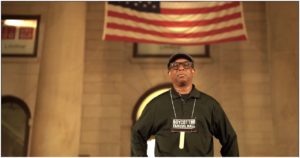by Jeroslyn JoVonn
November 6, 2025
Grocery stores in North Philadelphia see a drop in sales amid cuts to SNAP benefits.
With SNAP benefits reduced due to the ongoing government shutdown, grocery stores in North Philadelphia are reporting a decline in sales.
According to the nonpartisan Center for American Progress, supermarkets in high-poverty areas could see sales decline by 40% to 90% due to SNAP cuts. With SNAP payments not being distributed on Nov. 1 to 42 million Americans, including 2 million in Pennsylvania, 800,000 in New Jersey, and 100,000 in Delaware, Philadelphia grocers are already feeling the impact, NBC Philadelphia reports.
“I really think it’s not going to be a holiday this year,” Alex Ibrahim, the manager of Cousin’s Supermarket in North Philly, said of Thanksgiving. “I think already people are very stressed and only spending the couple of dollars they might have saved.”
Ibrahim noted that his store has experienced a drop in sales since SNAP payments were paused. While prices haven’t increased, he has observed changes in customers’ spending habits.
“I believe it is really affecting all our customers, like our revenue went down 50-60%,” Ibrahim said.
Jose Rodriguez, a North Philadelphia resident, warned that SNAP cuts could push people to take drastic measures to put food on the table.
“It is bad because the parking lot is empty. That means the supermarket is going to make no money,” Rodriguez said. “I think people are going to start stealing. They are going to start doing things just to start putting food on the table. People are capable of doing anything when it comes to hunger.”
With the government shutdown ongoing, the Trump administration announced it will reduce November SNAP benefits by slightly less than initially planned. In updated guidance to states, the U.S. Department of Agriculture said maximum allotments will be cut by 35% rather than the previously proposed 50%.
The administration announced that participants receiving the maximum SNAP benefits will now get roughly 65% of their usual assistance in November. Advocates and policy groups note that most recipients, those with additional income from Social Security, disability, or employment, will see significantly smaller payments.
In a letter to the USDA, Pennsylvania Human Services Secretary Val Arkoosh criticized the federal government for “directing states to use the most complex and labor-intensive approach possible.” Pennsylvania is seeking to use a more straightforward, faster method previously allowed for pandemic-related aid, which would provide everyone with roughly half their SNAP payment.
Meanwhile, concerns over delays and missed payments have prompted a coalition of cities and nonprofits to return to federal court in Rhode Island, seeking to compel the Trump administration to resume SNAP aid “expeditiously.”
RELATED CONTENT: New Jersey’s Misplaced Focus: 77-Year-Old Assata Shakur Tops The State’s Most Wanted List







